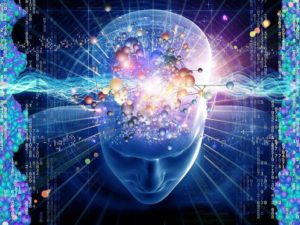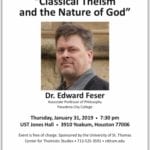Faith or Feelings? A Non Rational Aspect of Religious Experience
As has been partially defined in our posts on faith in science (One and Two), faith is essentially non-rational but evidence based (defined not in the restricted sense given by empiricists but also including the type of faith you may have in the news anchors on TV), not anti-rational as many positivists (people like Richard Dawkins/Hitchens/Dennett) would have people believe.
While many posts have yet to be created on the very important topic of the relationship between faith and reason, here I wish to bring up a slightly different topic: what is the non-rational element common in the religious experience and what is its worth in determining ‘what is really the case’ about God?
Please listen to this music so that we may have something to start with, while you read on:
Rudolf Otto, in The Idea of the Holy – On the Irrational in the Idea of the Divine and its Relation to the Rational (Das Heilige – Über das Irrationale in der Idee des Göttlichen und sein Verhältnis zum Rationalen), pursues an aspect of that nonrational part of religion.
I think this is an important topic because many times it is easy to confuse the ‘religious experience’ with ‘interaction with the divine’ as nearly every one of the above-mentioned positivist authors do (not to mention many religious believers themselves). For example, a charismatic is ‘slain in the spirit’ vs. St. Theresa of Avila entering into ecstasy in prayer vs. a Buddhist monk levitating vs. a secular humanist using the power of humanity expressed in rock n roll to change the world!!! (Half kidding). How is it possible to determine what is a legitimate experience of God (if any) and which are not?
First, lets define what Otto calls the Mysterium Tremendum. Of course the positivist would say that the experiences are all merely feelings which in no way transcend ourselves. In other words, they are an illusion if you are trying to learn anything about the world outside yourself. Of course, I would disagree…and so would Otto.
I prefer to render mysterium tremendum in English as ‘shaking mystery.’ This experience means something to us–it reminds us and points us towards that which is beyond us. We experience transcendence of ourselves. Someone might have a similar experience staring at a tombstone. We are shaken out of our day to day life and pointed towards some eternal mystery and reflection. According to Otto, mysterium has two elements to it while the tremendum has three:
Mysterium
- Wholly other, completely amazing and entirely outside normal experience.
- Fascination which causes the person experiencing it to be entirely caught up in it.
- Wonder and Awfulness (a sort of profound unease),
- Overpoweringness (that which, among other things, inspires a feeling of humility),
- Energy (creating an impression of immense force).
For Otto, this mysterium tremendum is associated with all religious experience and is essentially a feeling or experience rather than something that can be stated in the form of a proposition…somewhat akin to the way we ‘know’ that we could have chosen otherwise on any given decision (determinists disagree) or to how we know that 1=1. These are axioms, or non syllogistic knowledge and the mysterium tremendum comes into our experience and possible knowledge in the same way that the axioms do.
So, how is it possible to determine which are legitimate experiences of God (if any) and which are not? In my opinion, religious experience of this type is not sufficient, as evidence, for belief in a God on a rational or faith based level, but rather, it is like a sign which points us in a direction. Otto says these experiences are part of the human condition and have been around as long as religion has been around. The reductionist/positivist would of course like to say these are really quite worthless beyond how they make you feel. This signpost analogy gets us into a topic which will be surely be brought up in future posts: teleology–the idea that objects are oriented towards acting in certain ways.
However, in comparing St. Theresa’s ecstasy to a rock concert (including the use of many feeling inducing drugs), I believe that since they are non-rational experiences and based on faith (a personal decision to believe an informant amid doubt is the definition Cardinal Newman gives for faith), they are essentially not interpersonally useful in the same way. Any communication about their meaning is going to be interpreted by the person experiencing them and would require faith from those being told about the experience second hand that the interpretation is correct.
However on an individual and personal level, I think we can say that these experiences, whether caused by true religious experiences or not, point us to the truth that there is something greater than ourselves. We can consider these experiences generically as we consider gravity. Gravity reminds us that our mass is smaller than the earth’s, but if we concern ourselves with gravity per se will be missing the point: gravity’s significance is entirely dependent upon the mass of the object that it draws things towards. Are able to experience ‘gravity’ first as well (for example, most religions regard drugs as counter to the experience of the divine).
In conclusion, mysterium tremendum, (assuming that the experience meets the criteria for mysterium tremendum to begin with–usually drugs won’t do it…), should be considered neither sufficient nor necessary for one have faith in a particular interpretation/religion, for example Christ as the son of God, creator and sustainer of the universe, but as a typical occurance, whose meaning (or lack thereof) is given by the ‘experiencer.’
This opens another topic for a later post, the topic of the expression of the mysterium tremendum. The expression of this mystery should continue to be regarded as a sign pointing towards something higher and if it can be used in a liturgy for example, why shouldn’t it be? What is wrong with communicating something higher? However individuals’ faith cannot be based merely on this since faith requires more than the mystery.
These are just some thoughts I have been having today and I am fully aware that this post barely scratches the surface and probably creates more questions than it answers…so….before closing this tab, why not create more! I leave you with two quotes:
“Christ continued, “I went through the worlds, I ascended to the Sun and flew with the Milky Way through the desert of the Heavens; but there is no God. I descended to the depths of Being’s shadow, and looked into the Abyss and cried, “Father, where are you?” but I heard only the eternal storm that no one governs, and the shimmering rainbow of Existence stood, without the sun that creates it, dripping into the Abyss. And when I looked upon the enormous world under the divine eye, it stared back from an empty, bottomless socket; and eternity lay and gnawed on Chaos and contemplated itself.—Scream on, discords, rend the shadows; for He is not!”…and pressed together crushing the endless temple to a church graveyard-and everything was tight, dark, bang – and an immensely extended bell hammer should strike the last hour of the time and shatter the edifice of the world … when I awoke. My soul wept for joy that he again was able to worship God – and the joy and the tears and the faith in him was the prayer. And when I got up, the sun glowed deep behind the full purple corn stalks and threw peacefully to the reflection of her evening red the little moons that rose without an aurora in the morning.” Richter, Jean Paul. Siebenkäs. Projekt Gutenberg-DE. SPIEGEL
The great voice, which rose up from somewhere close to the light, went through my whole body in such swift wave of terror that it blotted out even the pain in my arm. It was no ugly sound; even in its implacable sternness it was golden. My terror was the salute that mortal flesh gives to immortal things. And after — barely after — the strong soaring of its incomprehensible speech, came the sound of weeping. I think (if those old words have a meaning) my heart broke then. But neither the immortal sound nor the tears of her who wept lasted for more than two heartbeats. Heartbeats, I say; but I think my heart did not beat till they were over. -C.S. Lewis, Till We Have Faces





